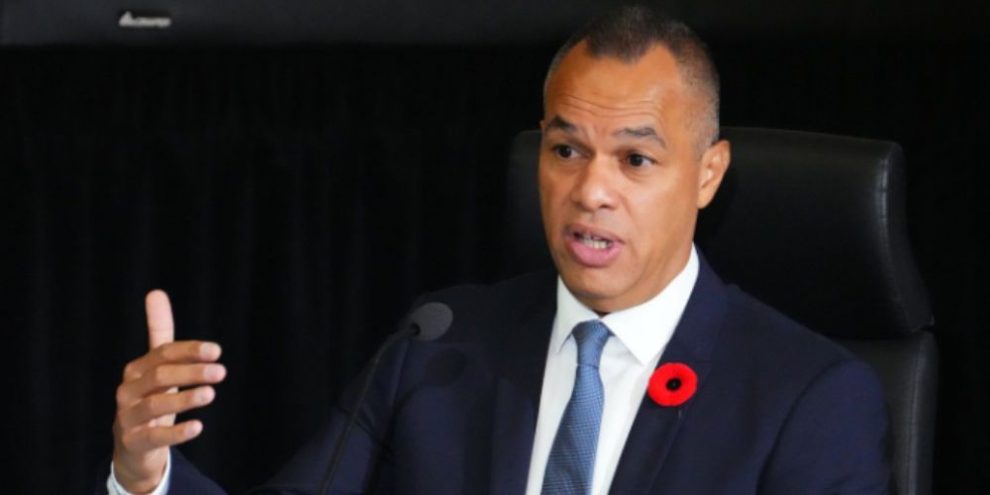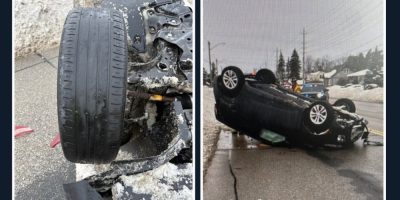
By Laura Osman and David Fraser in Ottawa
A lawyer for the Ottawa police suggested Monday that former chief Peter Sloly was concerned about losing his job — and was already looking for someone else to blame — several days into the "Freedom Convoy" protests that gridlocked the capital city last winter.
The accusation led to a tense exchange as Sloly, who resigned as Ottawa's police chief at the height of the demonstrations, continued his testimony at a public inquiry investigating the federal government's use of emergency powers weeks into the crisis.
"You were pretty concerned that you would lose your job and be blamed for what had happened?" Ottawa police lawyer David Migicovsky asked Sloly.
The former chief emphatically denied the suggestion.
"Absolutely not, sir," Sloly responded.
"And what you were looking for was to blame somebody else?" Migicovsky pressed.
"Absolutely not, sir," Sloly said.
The commission of inquiry is examining the circumstances that led to the Liberal government's decision to invoke the Emergencies Act for the first time on Feb. 14, the day before Sloly stepped down from his role.
The Emergencies Act, which became law in 1988, is meant to be used when an urgent, critical and temporary situation threatens the lives, health or safety of Canadians, the provinces are thought to lack the capacity or authority to respond and the crisis cannot be handled effectively with existing laws.
The inquiry has so far painted a picture of conflict and confusion within police services and among all levels of government after the convoy's arrival in Ottawa in late January.
Sloly, blamed by other police witnesses for a disorganized response, told the inquiry on Friday that as the protest dragged on and pressure mounted, he felt his leadership being called into question.
In another exchange on Monday, Migicovsky argued that Sloly was looking to blame Steve Bell, who was then his deputy chief, for failing to plan for the protest.
He presented notes from another deputy chief, Patricia Ferguson, that made a similar accusation.
"Advised chief is looking for emails to support I/we purposely left him out of the information look on the demo coming," said Ferguson's notes from Feb. 14. The documents were submitted as evidence to the inquiry.
Sloly said that the accusation was "absolutely incorrect," and that he took offence to the notion.
The former police chief did confirm he took a more direct role in the police response to the protest after he lost some degree of trust in his deputies.
He said he was concerned after his deputies named a new event commander without telling him, but that he never fully lost confidence in them.
The officer who was appointed to the role without his knowledge was still under review at the time for his leadership after a 2021 street party got out of hand following a University of Ottawa football game, Sloly said.
Sloly has been repeatedly accused of creating confusion and dysfunction in the ranks of the Ottawa Police Service during the protest by not abiding by the chain of command.
Sloly says all of those accusations have come second-hand.
"Absolutely everything asserted about because come through a rumour or something that went around the station. That's the only thing that I've heard so far," he told the commission.
Police contracted a public relations firm, Navigator, to help with communication during the protest, Sloly said.
On Feb. 6, the firm performed an audit that included an assessment of Sloly's reputation by scanning local, national and social media. Its report was submitted as evidence to the inquiry.
Of more than 20,000 social media posts about the Ottawa police that the firm identified that day, 10 days into the convoy protests, only one per cent were related to the chief and resignation. Navigator determined that the calls for him to lose his job originated with people in Ottawa and Toronto.
But none were from important figures, they concluded. "From our analysis, no major politicians have called on the chief’s resignation," the report read.
An invoice tabled with the commission shows Navigator billed the police service $185,992.85 for services between Jan. 30 and Feb. 28.
This report by The Canadian Press was first published Oct. 31, 2022.
Banner image via The Canadian Press






